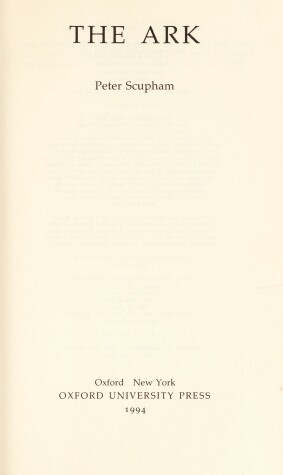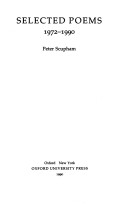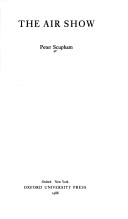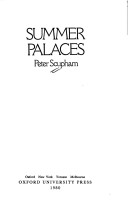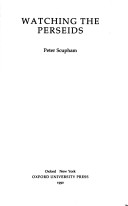Oxford Poets S.
5 total works
The Ark is Peter Scupham's latest collection of poems, following his Selected Poems and Watching the Perseids , both published by OUP in 1990. The poems explore questions hovering on the borderlines of `is' and `seems', life and death, truth and lies. His Ark is steered to `its safe and certain loss' with a freight of dreams, memories, terrors, gifts; it is a habitation that carries him through varied landscapes and weathers to a possible Ararat. Three very different sequences hold the collection together: an experimental sequence, `Accident', followed by `Annunciations', and `A Habitat', a group of poems loosely surrounding the retrieval of an old house from its ghostly past. This book is intended for readers of comtemporary poetry.
This selection, made by Peter Scupham himself, brings together work from his eight individual collections, r{from hs first book The Snowing Globe in 1972 to his latest, Watching the Perseids in 1990. This book is intended for poetry readers.
Peter Scupham was born in Liverpool in 1933. He is married with four children and now lives in Hitchin where, with John Mole he has run for many years the Mandeville Press. Peter Scupham's new book of poems - his seventh - brings together the themes of childhood and war: themes which seem naturally connected to Scupham, who was himself a child during the Second World War. The intense rumours, sights and sounds of war accompany his move from Derby to a Cambridgeshire village, and are ever-present during his holidays with grandparents in Lincolnshire. Old toys, period postcards, and revisiting places of the past all help him in his attempt to crack 'Enigma', the coded complex of signals transmitted by the child he once was. He describes the details of a young boy's domestic and natural world with an almost hallucinatory precision and beauty, yet the treasured memories of childhood possess disturbing undertones, and the details lead, more often than not, to the world at war.
In Summer Palaces, PS's eloquent and elaborate style, once decribed by Roger Garfitt 'as a stratagem, a way of of writing affirmative poetry in a cynical age', lends itself to a collection of greater variety than before. A book of epiphanies, celebrations and elegies, in which the sense of history is lighty carried, it is built around four poem sequences, TS, CC, MW and N (cf Contents below). Another group, on amateur theatricals from front and backstage, provides a subject which seems particularly well-suited to Scupham's preception of the mixture of illusion and actuality. The central imagery of his poetry is drawn from the natural world, but a world transformed by the eyes of a child, the standing stones on a moorland, or the elusive appearances of the geni loci, the spirits of place.
Peter Scupham's eighth book of poems contains two central sequences: the first, written after the death of his mother, imagines various scenes from her life; the second is a more immediate recording of his father's conversations during the last few days of his life, as the poet nursed him. It is a brave and extraordinary book, in which Scupham's experience as a craftsman of words, and his haunted sense of time, come into their own. This book is intended for poetry lovers.
